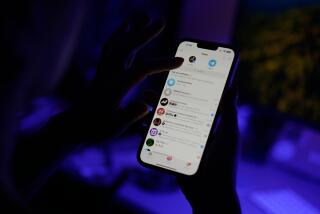Jury Is Told Papers Link Plotter to 9/11
- Share via
ALEXANDRIA, Va. — Hoping to put to death the only man charged in the Sept. 11 conspiracy, federal prosecutors opened the sentencing trial for Zacarias Moussaoui on Monday by revealing that documents linking him to the four men who piloted the hijacked jets were in his possession when he was arrested three weeks before the attacks.
Assistant U.S. Atty. Robert A. Spencer told the jury that if Moussaoui, then in custody on a visa infraction, had told FBI agents about his phone calls and two lists of flight schools hidden in his duffel bag, the government could have prevented the deadliest terrorist operation in U.S. history.
“The FBI would have quickly been on to all four pilots of the hijacked planes,” Spencer said. “But Moussaoui lied so his brothers could go forward. He lied and nearly 3,000 people perished.”
Spencer said that the FBI would have contacted the flight schools to immediately locate and arrest the four pilots; if that failed, he continued, agents would have alerted airport officials to keep the hijackers from approaching security gates or boarding planes.
But Moussaoui’s defense lawyers, in their opening statement, told the jurors that agents were highly suspicious of Moussaoui, but they never formally sought or obtained a government search warrant to open his belongings.
Furthermore, the defense lawyers said, authorities knew that several hijackers were already in the United States, but because of government infighting never devoted the resources to hunt them down.
One of the court-appointed lawyers, Edward B. MacMahon, characterized Moussaoui, a French citizen and self-admitted member of Al Qaeda, as more of a dunce who was never taken seriously by U.S. authorities. He noted that after Moussaoui was arrested Aug. 16, 2001, no one from a terrorist cell in this country or operatives abroad contacted him or came to his aid.
One Al Qaeda member later conceded that Moussaoui was considered “cuckoo in the head,” MacMahon said, and the terrorist organization gave him money at times “just to get rid of him.”
MacMahon said Moussaoui, who was trying to learn to fly jumbo jets when he was arrested in Minnesota, was inept, asking flight instructors whether an airplane door could be opened at 40,000 feet and whether the cabin was pressurized.
The defense lawyer further suggested that Al Qaeda chiefs had placed Moussaoui in the United States to throw federal agents off the track of the real plot, in which four jets were hijacked and flown into the World Trade Center towers and the Pentagon. The fourth plane, forced down into a Pennsylvania field, never reached its target.
“Moussaoui did not train with them because he was not on their team,” MacMahon said.
The 37-year-old Moussaoui, a Moroccan by descent who turned to radical Islamic fundamentalism in Britain, pleaded guilty in April to six criminal charges in the Sept. 11 conspiracy.
Three of the charges make him eligible for the death penalty. He admitted that he had conspired to commit acts of terrorism, that the conspiracy was aimed at destroying aircraft and that planes were used as “weapons of mass destruction.”
Because he already has pleaded guilty, the 10 men and seven women chosen as jurors and alternates Monday morning have two tasks.
First, the jury -- whose 12 members will be designated as deliberations begin -- must decide whether the government proved that Moussaoui’s refusal to cooperate with the FBI after his arrest left them unable to unravel the Sept. 11 plot and arrest the hijackers. If they decide not, he automatically would be given life in prison with no parole.
If prosecutors make their case, the sentencing trial would move into a second phase. The government would be allowed to bring survivors and families of the Sept. 11 victims into the courtroom to describe their loss.
Likewise, the defense team could present testimony about and evidence of Moussaoui’s mental instability.
The defense emphasized to the jury Monday that like the Sept. 11 hijackers and other Al Qaeda suicide bombers, Moussaoui was seeking death.
“We know that Moussaoui is yearning for martyrdom,” MacMahon said. “He wants his smiling face on all the future Al Qaeda recruitment posters.”
But, his defense lawyer said, “he doesn’t deserve that.”
Unlike previous courtroom appearances, which he disrupted with outbursts such as “I am Al Qaeda,” Moussaoui sat fairly calmly throughout Monday’s proceedings. Clad in a green prison jumpsuit and white knit cap, he was surrounded by marshals.
During one court recess, as he was being escorted from the room, he blurted out: “All of this is an American creation. This has nothing to do with me.”
Later, when videos were shown of Al Qaeda recruits singing songs during training sessions, Moussaoui could be seen mouthing the words. At day’s end, as he was being taken back to his solitary jail cell, he grumbled: “It’s your story.”
Outside the courtroom, several relatives of Sept. 11 victims said they hoped the trial remained focused on what Moussaoui could have done to stop the plot, and not on whether government agents missed opportunities to arrest the 19 hijackers.
“We all know this country made a lot of mistakes,” said Brad Burlingame, whose brother, Charles Burlingame, was captain of American Airlines Flight 77, which was flown into the Pentagon. Moussaoui, he said, “was aware of the plot and he had information that he chose not share.”
More to Read
Sign up for Essential California
The most important California stories and recommendations in your inbox every morning.
You may occasionally receive promotional content from the Los Angeles Times.











